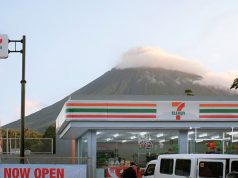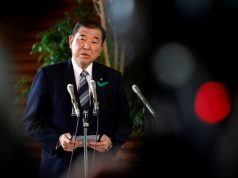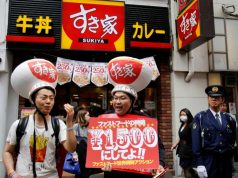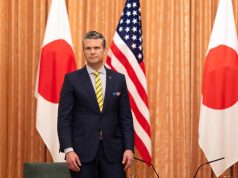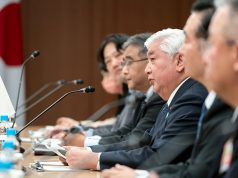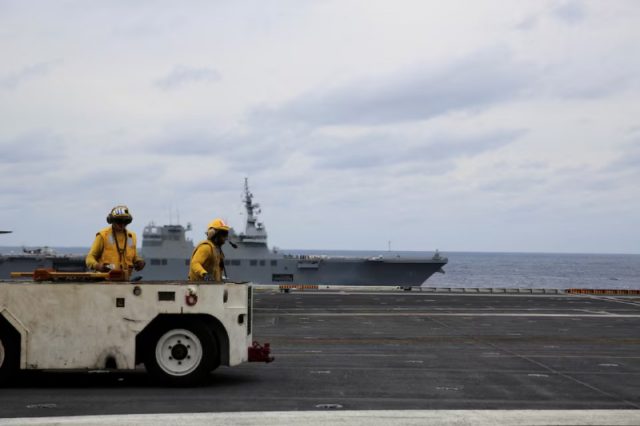
- U.S., Japan hold high-level security talks in Tokyo
- U.S. to establish new joint command HQ in Japan
- Allies say China ‘greatest challenge’ facing region
- Countries pledge ‘unshakable partnership’ with S.Korea
TOKYO (Updated 5:25 p.m.) — The United States said on Sunday it would revamp its military command in Japan to deepen coordination with its ally’s forces, as the two countries labelled China the “greatest strategic challenge” facing the region.
The announcement followed security talks in Tokyo between U.S. Secretary of State Antony Blinken and Secretary of Defense Lloyd Austin and their respective Japanese counterparts, Yoko Kamikawa and Minoru Kihara.
The new “joint force headquarters” will facilitate deeper interoperability with Japan’s armed forces and aims to be implemented in parallel with Tokyo’s own plans to establish a joint command to oversee its forces by March, according to a statement issued after the “2+2” talks.
The upgrade to the U.S. command in Japan is “one of the most significant developments in the history of our alliance”, Austin told reporters before the talks began.
The overhaul is among several measures taken to address what the countries said was an “evolving security environment”, noting various threats from superpower China.
“We continue to see the PRC (People’s Republic of China) engaging in coercive behaviour and trying to change the status quo in the East and South China Sea, around Taiwan and throughout the region,” Austin said.
The statement criticized what it called Beijing’s “provocative” maritime actions, joint military exercises with Russia and the rapid expansion of its nuclear weapons arsenal.
China’s foreign ministry did not immediately respond to a request for comment from Reuters.
U.S. nuclear umbrella
Beijing’s “foreign policy seeks to reshape the international order for its own benefit at the expense of others,” the ministers said in their statement.
“Such behavior is a serious concern to the Alliance and the entire international community and represents the greatest strategic challenge in the Indo-Pacific region and beyond”.
For the first time, the ministers also discussed “extended deterrence”, a term used to describe the U.S. commitment to use its nuclear forces to deter attacks on allies.
It is sensitive subject in Japan, which has pushed for non-proliferation of nuclear weapons and is the only country to have suffered atomic bomb attacks.
The countries discussed reinforcing extended deterrence to promote regional stability and deter the outbreak of conflict, according to an official readout that was scant on detail.
“We are at a critical juncture. In order to thoroughly defend the existing international order, we need to continuously strengthen our alliance and enhance the deterrence – the power,” Japan’s Kamikawa told reporters at the outset of the talks.
Japan provides a base for the U.S. to project military power in Asia, hosting 54,000 American troops, hundreds of U.S. aircraft and Washington’s only forward-deployed aircraft carrier strike group.
Prompted by China’s growing military might and regular missile tests by nuclear-armed North Korea, Japan has in recent years shifted dramatically from decades of postwar pacifism. In 2022 it unveiled a plan to double defense spending to 2% of gross domestic product.
The new U.S. command in Japan will be headed by a three-star general, not the four-star rank that Japan had requested, a U.S. official told a briefing ahead of the talks. The statement makes no reference to this.
South Korea cooperation
The allies also expressed deep concern about Russia’s procurement of ballistic missiles from North Korea to aid its war in Ukraine and the potential for Moscow to transfer weapons of mass destruction or missile-related technology to Pyongyang.
North Korea has vowed to “totally destroy” its enemies in case of war, North Korean state media KCNA reported on Sunday.
Austin and Kihara also met South Korean Defence Minister Shin Won-sik, signing an agreement to “institutionalise” trilateral cooperation through efforts like real-time sharing of North Korean missile warning data and joint military exercises.
The Biden administration has been pushing for deeper cooperation between Tokyo and Seoul, whose strained relations date back to Japan’s 1910-1945 occupation of Korea.
“This memorandum strengthens the cooperation between Japan, the United States and South Korea, making our partnership unshakable, no matter how the international situation changes,” Kihara told reporters after the trilateral meeting.
Washington also wants to tap Japanese industry to help ease pressure on U.S. weapons makers stretched by demand generated by conflicts in Ukraine and the Middle East.
Tokyo and Washington are pursuing various collaborations in this field, including advancing missile co-production efforts as well as building supply chain resilience and facilitating ship and aircraft repair.
However, one flagship project – a plan to use Japanese factories to boost production of Patriot air defence missiles – is being delayed by a shortage of a critical component manufactured by Boeing, Reuters reported this month.
After leaving Tokyo, Blinken and Austin will hold security talks with another Asian ally, the Philippines, as the Biden administration seeks to counter an increasingly bold China.
Blinken met with his Chinese counterpart Wang Yi in Laos on Saturday and repeated that Washington and its partners want to maintain a “free and open Indo-Pacific,” according to a U.S. readout of the meeting.
—Reporting by Simon Lewis and Tim Kelly in Tokyo; Additional reporting by Idrees Ali in Washington; Writing by John Geddie; Editing by William Mallard and Michael Perry





